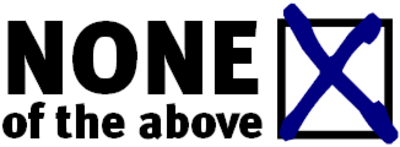Were we ever a ‘protest party’?

According to a recent television programme, we have been perceived by some of the electorate as a 'party of protest' - or a 'none of the above' vote - at least until UKIP came along.
This is not an image of the Liberal Democrats that I recognise, although some of the antics of some during the latter part of our tenure in coalition could have given rise to the opinion that we are incapable of presenting a united front even when times were good. I would argue that it was this, including constant carping from those who should have known better within the higher echelons of the party, which really harmed us in the eyes of the electorate.
Minority parties in a coalition traditionally do badly in the next election, but I would argue that we would not have done as badly as we did, had not so many been lining up to lay 'blame' on Nick Clegg for having had the temerity to do what he thought was in the interest of the country and support the party which gained the most seats. The alternative was to support the one that had failed to protect the economy from the impact of a recession caused in no small part by the poorly-regulated activities of the banks.
As part of the current leadership election (yes I have voted: have you?!) we really do need to alter this perception by explaining what the Liberal Democrats stand for. In theory, this is next to impossible, given that we are a member-driven party and one that does not, unlike the two main ones, have a specific axe to grind on behalf of 'labour' or 'capital'. But I suggest that such an interpretation is far from reality.
The fact that we represent the views of ordinary people who care about the country and the environment does not make it easy to say what we stand for because, unlike those with doctrinaire views, we tend to think about each issue as it presents itself and then decide what is the right choice to make in the interests of the entire country, with emphasis on what is best for those least able to look after themselves.
A difficult, but not impossible, task I would suggest. All we need do, is say what we stand for at the highest level and that our actions will be determined by that stance, not the diktats of a centralist party control.
For example, the desire not to increase University fees was a position taken on the highest principle, but could not be sustained if the country was to enjoy stable government for half a decade. What we might, perhaps, have done was to make more play on the fact that the 'climb-down' was deeply regretted, but unavoidable - and explained why this was so.
Perhaps now is the time to set out our stall for the next elections. Perhaps, as a starting point we might say:
- We believe that the most vulnerable in society should be protected;
- We believe that everyone who can, should make a contribution towards the general wellbeing of the country;
- We believe that the United Kingdom should play its full part on the stage of Europe, but not at the expense of unfairly disadvantaging its people;
- We believe that the richer nations must help protect weaker ones;
- We believe that the actions of humanity should not be allowed to destroy the natural resources of the planet, or the wellbeing of any of its inhabitants, including ourselves;
- We believe that the causes of worldwide terrorism cannot be addressed solely by force, but that we must also address the reasons that lead people to consider that they have an unaddressed grievance;
- We believe that we should listen to other people and adjust our views if we are convinced they are right.
The worst thing we could do is to write our opinions on tablets of stone. That has only worked once in history and that was not in April 2015.
---
 Stephen Phillips is a member of the Shepway Liberal Democrats, and his views are not necessarily those of the Party. He has been writing professionally for many years on investment and economic related issues, and has focussed recently on creative writing.
Stephen Phillips is a member of the Shepway Liberal Democrats, and his views are not necessarily those of the Party. He has been writing professionally for many years on investment and economic related issues, and has focussed recently on creative writing.
You can find Stephen online at www.phillips-writer.co.uk
